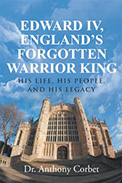
 |
Edward IV, England's Forgotten Warrior King: His Life, His People, And His Legacy
by Dr. Anthony Corbet
iUniverse
Edward IV was called by some the Merchant King. However, his early success came as a Warrior King who lead his army from the front lines. Winston Churchill offered praise saying that underneath all of Edward's human faults, the king "shrouded a profound political ability."
Exactly what were the faults of Edward of York living in the 1400s at the end of the War of Roses? Today would these be considered positive traits? Edward magnanimously forgave Lancaster adversaries, who later took advantage of the generosity and repeatedly schemed or fought against him. He named his brother, Richard, as protector for his sons. When Edward died an early death, Richard likely caused his 13 and 11 year old nephews to be put to death in the Tower, before usurping the throne with lies.
Edward chose an intelligent woman as queen in spite of Elizabeth's Woodville blood line. But he didn't marry her immediately, knowing this action could cause trouble for establishing the kingdom. It later did.
Edward was a clever businessman. During his reign London boomed with shipping and importing, while laws protected certain English goods as wool for weaving. His treaty with the King of France provided a pension that made Edward independently rich, but all wealth was stolen from his family when he died. Ironically, Edward disregarded responsibility to the kingdom by behaving as a free-spirited youth, fishing on the Thames in a cold spring rain and eating his contaminated catch. He died at forty-one of fatal infections.
Perhaps, the writing of this truly interesting story deserved the expertise that a biographer could have brought to the book, but Dr. Colbert's research into the laws of marriage and succession are impressive, taking up three chapters. His discussion of archeological proof regarding the death of the young princes is highly professional. Overall, this brings interesting insight into this rich historical character.